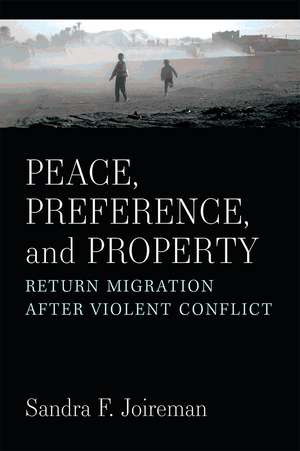Peace, Preference, and Property: Return Migration after Violent Conflict
Autor Sandra F Joiremanen Limba Engleză Paperback – 29 noi 2022
Using case studies and first-person accounts from interviews and fieldwork in post-conflict settings such as Uganda, Liberia, and Kosovo, Sandra F. Joireman highlights the divergence between these policies and the preferences of conflict-displaced people. Rather than looking from the top down, at the rights that people have in international and domestic law, the perspective of this text is from the ground up—examining individual and household choices after conflict. Some refugees want to go home, some do not want to return, some want to return to their countries of origin but live in a different place, and others are repatriated against their will when they have no other options. Peace, Preference, and Property suggests alternative policies that would provide greater choice for displaced people in terms of property restitution and solutions to displacement.
| Toate formatele și edițiile | Preț | Express |
|---|---|---|
| Paperback (1) | 263.84 lei 3-5 săpt. | +15.21 lei 6-10 zile |
| UNIVERSITY OF MICHIGAN PRESS – 29 noi 2022 | 263.84 lei 3-5 săpt. | +15.21 lei 6-10 zile |
| Hardback (1) | 452.03 lei 3-5 săpt. | +17.50 lei 6-10 zile |
| UNIVERSITY OF MICHIGAN PRESS – 28 noi 2022 | 452.03 lei 3-5 săpt. | +17.50 lei 6-10 zile |
Preț: 263.84 lei
Nou
Puncte Express: 396
Preț estimativ în valută:
50.49€ • 52.16$ • 42.02£
50.49€ • 52.16$ • 42.02£
Carte disponibilă
Livrare economică 05-19 martie
Livrare express 18-22 februarie pentru 25.20 lei
Preluare comenzi: 021 569.72.76
Specificații
ISBN-13: 9780472039104
ISBN-10: 0472039105
Pagini: 192
Ilustrații: 3 charts, 4 maps, 5 tables
Dimensiuni: 152 x 229 x 15 mm
Greutate: 0.26 kg
Editura: UNIVERSITY OF MICHIGAN PRESS
Colecția University of Michigan Press
ISBN-10: 0472039105
Pagini: 192
Ilustrații: 3 charts, 4 maps, 5 tables
Dimensiuni: 152 x 229 x 15 mm
Greutate: 0.26 kg
Editura: UNIVERSITY OF MICHIGAN PRESS
Colecția University of Michigan Press
Notă biografică
Sandra F. Joireman is Weinstein Chair of International Studies and Professor of Political Science at the University of Richmond.
Cuprins
List of Illustrations
Preface and acknowledgements
Chapter 1: Forced Migration and its Troublesome Solutions
Chapter 2: International Law on Return
Chapter 3: Challenges to Return: Preferences of Displaced People
Chapter 4: Children Displaced by Violence
Chapter 5: Property and Return
Chapter 6: Global Governance and the International Migration Regime
Appendix
Glossary
Bibliography
Preface and acknowledgements
Chapter 1: Forced Migration and its Troublesome Solutions
Chapter 2: International Law on Return
Chapter 3: Challenges to Return: Preferences of Displaced People
Chapter 4: Children Displaced by Violence
Chapter 5: Property and Return
Chapter 6: Global Governance and the International Migration Regime
Appendix
Glossary
Bibliography
Recenzii
“So far, few books have paid attention to the historical patterns of displacement, legal solutions, and IDP/refugee attitudes. Joireman successfully breaks the pattern of single-case studies in this area by providing an array of comparative empirical evidence and first-hand policy experience to demonstrate the misalignment of international law and preferences of victims of displacement. An excellent contribution to the field, re-orienting our understandings of durable solutions to displacement.”
—Neophytos Loizides, University of Kent
—Neophytos Loizides, University of Kent
“A crucially important and much needed book addressing the perplexing disconnect between the rights of displaced persons to return home, versus their preferences (and then decisions) for a variety of other remedies. Understanding this disconnect will become the priority in national and international approaches to managing forced migration and its repercussions.”
—Jon D. Unruh, McGill University
—Jon D. Unruh, McGill University
“It is often assumed that when armed conflicts come to an end, people who have been displaced by the violence will simply go back to their homes and resume their former lives. But as explained in this stimulating and highly original analysis, refugees are actually confronted with many difficult choices when they embark upon the process of return and reintegration.”
—Jeff Crisp, Refugee Studies Centre, University of Oxford
—Jeff Crisp, Refugee Studies Centre, University of Oxford
"All in all, this is a very worthwhile volume. Joireman familiarizes the reader with a wide range of cases in an erudite and accessible style. She combines a range of different methodological approaches, with a series of different cases, drawn from across the globe. . . By way of conclusion, I should like to commend Professor Joireman for her sympathetic approach to a particularly sensitive subject."
—The Developing Economies
—The Developing Economies
". . . the book’s concise nature, as well as its simple but fundamental argument, make it an important contribution to the literature."
—International Affairs
—International Affairs
"[A] valuable contribution to the growing body of work emerging over the past decades, contributing to improve our understanding of the conditions under which return to areas of origin in the past has or has not occurred, and under which types of conditions different patterns of return emerge."
—Ethnic and Racial Studies
—Ethnic and Racial Studies
Descriere
A bottom-up analysis of what displaced people need rather than what states want
